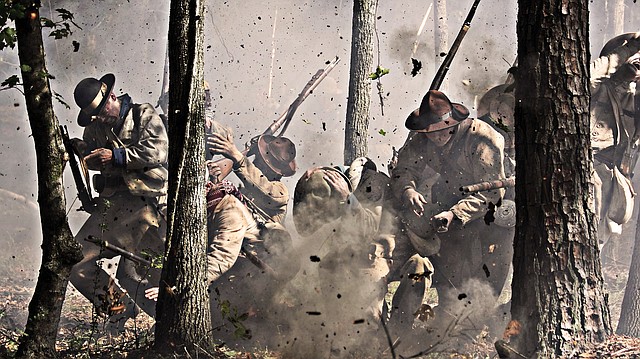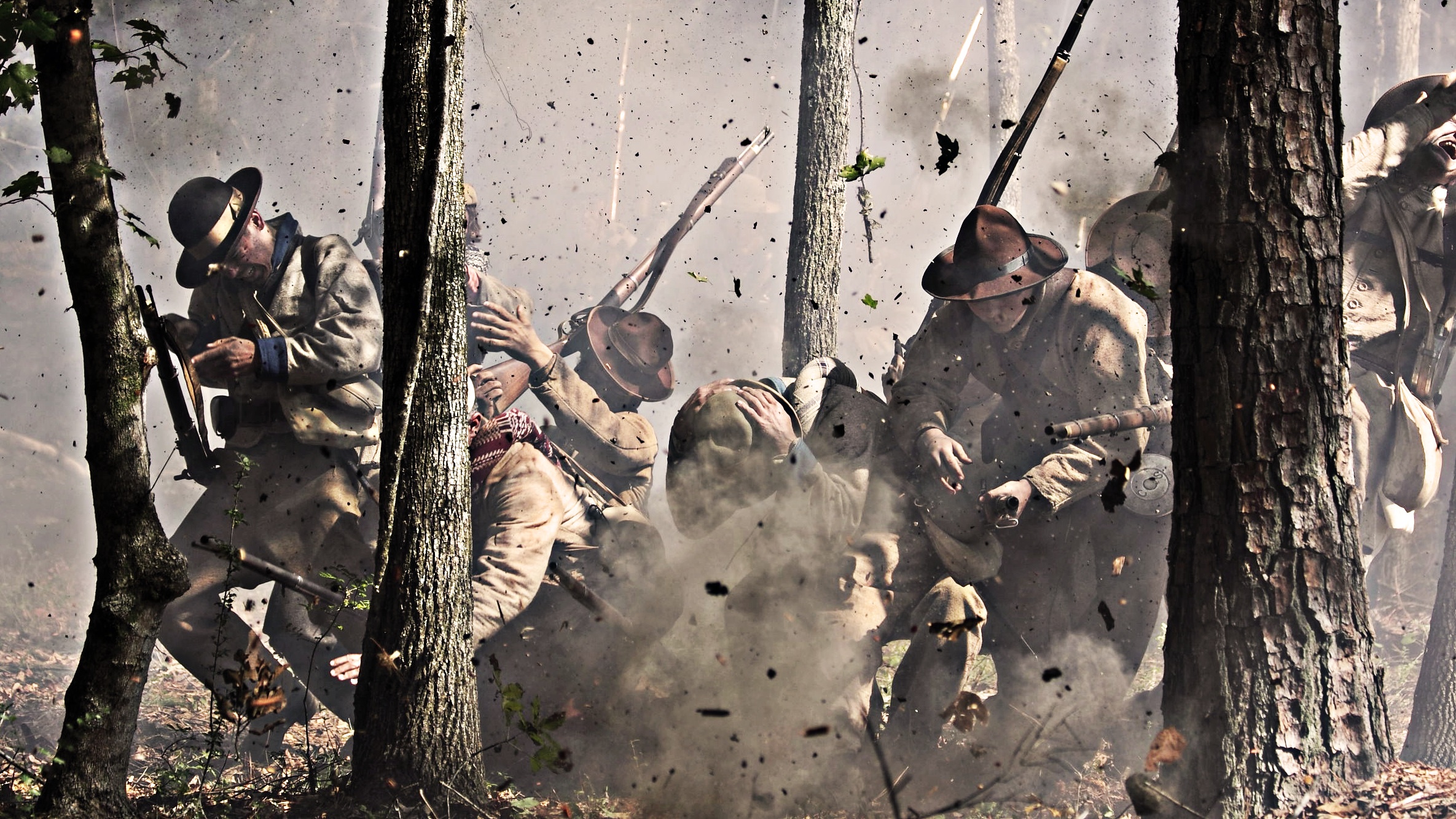Civil War documentary series begins on PBS
Thursday, March 27, 2014
"Civil War: The Untold Story," a new documentary series from Great Divide Pictures, will debut at 7 p.m. Sunday, April 6, on PBS stations, including Chattanooga's WTCI-TV 45. Rather than revisiting the oft-told stories of the battles of Bull Run, Antietam and Gettysburg in the eastern states of Pennsylvania, Maryland and Virginia, the series instead tells the stories of Shiloh, Vicksburg, Chickamauga, Atlanta and other battles in lands then known as "the West."
Many historians believe that the Western Theater was where the war was won -- and lost.
In addition to the epic battles, "Civil War: The Untold Story" provides new insights into the relatively unknown roles African-Americans played in the conflict, from enslaved to emancipated to soldier. Episode 4, "The Death Knell of the Confederacy," deals specifically with the battles around Chattanooga and North Georgia. The authenticity of uniforms, voice-overs and scenery is said to make it hard to distinguish this modern adaptation from the actual war.
PROGRAM NOTES
¦ Episode 1: "Bloody Shiloh" -- With the 1860 election of anti-slavery candidate Abraham Lincoln, 13 states from the South secede and form the Confederate States of America. Union military leaders, along with Lincoln himself, realize that ending the rebellion rests on controlling the Mississippi River. In February 1862, Union forces, led by an obscure general named Ulysses S. Grant, establish a foothold in southern Tennessee near a simple log structure known as Shiloh Church. On April 6, 1862, a Confederate force of over 40,000, led by Gen. Albert Sidney Johnston, launch a surprise attack on Grant. The fighting in the rugged terrain surrounding Shiloh is some of the most brutal of the entire war. By day's end, victory is in sight for the attacking Confederates. But Johnston has been struck in the leg by a bullet and bleeds to death in 20 minutes. The death of Johnston is a harbinger of a great change that will soon sweep over "Bloody Shiloh."
¦ Episode 2: "A Beacon of Hope" -- In the disaster at Shiloh, Union Gen. Ulysses S. Grant sees victory. On the night of April 6, 1862, Grant's beleaguered army along the Tennessee River is reinforced. The next morning, Grant's counterattack leads to victory. The defeated Confederate force of 40,000 retreats south to Corinth, Miss. At Shiloh, the Confederates lose arguably their best opportunity to change the outcome of the war. The shocking combined casualties of 24,000 men is more than in all the wars fought to that date in the United States. Many of the nearly 4 million slaves across the South see the war as an opportunity to seize their own destiny. Thousands of escaping slaves, dubbed "contrabands," seek refuge with Union forces advancing into the South. At Corinth, the Union army sets up a contraband camp. The former slaves begin building a community that includes a school, hospital and church. As thousands of slaves flee northward, the question asked all over America is this: Are they still slaves, or are they now free? In a cottage overlooking Washington D.C., Abraham Lincoln begins drafting a "proclamation" whose message will boldly answer that question.
¦ Episode 3: "River of Death" -- Abraham Lincoln's Emancipation Proclamation does not only free slaves in the rebelling states. It changes the war from one of reunification to one of ending slavery. The document also gives African-Americans freedom to fight. By war's end, some 200,000 will enlist. In truth, Lincoln's proclamation is an empty promise without the power of the U.S. Army to enforce it. In 1863, Gen. Grant begins a campaign to take Vicksburg, Miss., a Confederate citadel overlooking a strategic section of the lower Mississippi River. In May, Grant begins laying siege to the city of 4,500. On July 4, 1863 -- the day after Pickett's disastrous charge at Gettysburg -- the Confederates surrender Vicksburg to Grant. With the Mississippi River now under Union control, the campaign moves eastward to Chattanooga, a rail center that Lincoln considers to be as important as the Confederate capital of Richmond. Eight miles south, along the Chickamauga, a creek the Cherokee call "the river of death," Union and Confederate forces clash in what will become the biggest battle of the Western Theater.
¦ Episode 4: "Death Knell of the Confederacy -- Sept. 19, 1863. The first day of the Battle of Chickamauga ends in a bloody draw. On the next day, the battle is determined by one of the biggest blunders of the Civil War. Miscommunication, confusion and fatigue with Union Gen. William Rosecrans and his generals have left a gap in the Union line more than a quarter-mile wide. James Longstreet's force of 11,000 from the Confederate Army of Northern Virginia pour through the gap and split the Union army in two. Rosecrans and his beaten army escape to Chattanooga. Chickamauga's combined casualties of 34,000 are topped only by the carnage at Gettysburg. In October, Rosecrans is replaced by Grant, who immediately plans an offensive. In November 1863, Grant routes the Confederate stronghold just outside Chattanooga. As they escape southward into Georgia, a Confederate officer calls the devastating defeat: "the death knell of the Confederacy."
¦ Episode 5: "With Malice Toward None" -- In the spring of 1864, Gen. William Tecumseh Sherman's force of 100,000 men marches from Chattanooga toward Atlanta, the industrial hub of the Deep South. Twenty miles north of Atlanta, Sherman's army is soundly defeated at Kennesaw Mountain. Sherman's defeat, combined with Grant's stalemate in Virginia, enrages a Northern electorate already weary of war. The presidential election is in November, and Lincoln's chances for a second term are dwindling by the day. The Democrats nominate George McClellan. The party's platform calls for a negotiated peace with the Confederacy in which slaveholders will be allowed to keep their property. If McClellan is elected, Lincoln's Emancipation Proclamation will almost certainly be struck down. Though victorious at Kennesaw Mountain, the outnumbered Confederate Army falls back to a defensive position at Atlanta. After six weeks of bloody conflicts around Atlanta, Sherman wires Washington: "Atlanta is ours and fairly won." For the first time in the war, many in the North now believe victory can be achieved. Eight weeks later, the president defeats McClellan in a landslide. After the election, Sherman begins his March to the Sea. The largely unopposed march across Georgia to Savannah is a psychological blow to the Confederacy and a stunning conclusion to the Western Theater.

